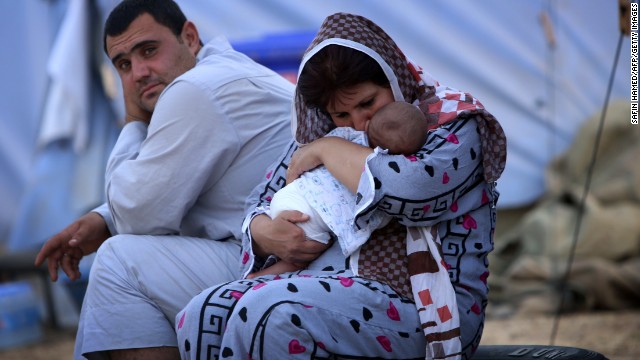More than a million Iraqis have been forced from their homes by conflict this year, the U.N. refugee agency said Friday — a number only likely to rise as Islamist militants and Iraqi security forces battle for control.
A humanitarian crisis is brewing, as families who’ve fled fighting with little more than the clothes on their back seek water, food and shelter from the summer heat.
Meanwhile, the first of up to 300 U.S. military advisers will arrive in Iraq as soon as Saturday, a senior defense official told CNN. This first group is expected to be very small, the official said.
In addition, some U.S. military personnel already in Iraq at the security cooperation office in the U.S. Embassy in Baghdad may be reassigned to work with them. Those already in Iraq could begin working immediately.

A woman cradles her baby Thursday, June 12, at a temporary camp set up in Aski Kalak, Iraq, to shelter those fleeing the violence in northern Nineveh province
Concern for the soaring number of people displaced in Iraq comes as the UNHCR marks World Refugee Day on Friday. Its report, based on data up to the end of 2013, finds that the number of refugees, asylum seekers and internally displaced people worldwide has, for the first time since World War II, exceeded 50 million people.
Now the crisis in Iraq — which was already sheltering hundreds of thousands displaced by the war in Syria — is swelling that number even further.
An estimated 500,000 people fled Iraq’s second-largest city, Mosul, last week after it fell to fighters from the Islamic State in Syria and Iraq.
Already, a half-million were displaced from Iraq’s western Anbar province, where the Sunni militants have been dominant since early this year.
Added to that are tens of thousands more who have fled their homes in Diyala and Salaheddin governorates amid the recent violence, UNHCR spokeswoman Ariane Rummery told CNN.
Will the number soar still higher? “In terms of the number of displaced people, that really depends on what happens,” Rummery said. “But what we know is that conflict and violence fuel displacement.
“With the humanitarian situation, we know that there’s a million people displaced and it’s not always easy to get to all of them.”
While some fleeing families have taken rooms in overcrowded hotels, others, low on funds, have had to take shelter in transit camps that have sprung up near checkpoints controlling entry to Iraq’s Kurdish-controlled north.
Those who have fled to the Kurdish region are easier to reach, Rummery said, but others have sought safety in less accessible regions.
U.N. High Commissioner for Refugees Antonio Guterres, speaking in Beirut, warned that any mass exodus of refugees from Iraq could be hard to cope with, given the regional situation. “I hope that this outflow will never come because the capacity of the region to deal with it is practically nonexistent,” he said.
Jacqueline Badcock, U.N. humanitarian coordinator for Iraq, said agencies were moving fast to try to meet the needs of Iraq’s newly displaced population, despite the volatile situation.
“Food, water, tents and other essential supplies are reaching families in need, additional staff are being mobilized, and emergency funds are being released,” she said. “I remind all parties to the conflict that they must allow unfettered and sustained humanitarian access to all people in need.”






Leave a reply